1. Six
2. Nine
3. Four
4. One
5. Seven
6. Three
7. Eight
8. Two
9. Ten
10. Five

1. Six
2. Nine
3. Four
4. One
5. Seven
6. Three
7. Eight
8. Two
9. Ten
10. Five

Some of my favourite ever songs sound like they come from the soundtrack to coming of age movies.
Songs such as Pretty in Pink by the Psychedelic Furs, the theme to the John Hughes ’80s classic starring Molly Ringwald. Or New Slang by The Shins, from the Zach Braff-directed Garden State, in which Natalie Portman’s character plops a pair of headphones on Zach’s ears and says, “This song will change your life”.
Foster the People have a song like that, actually called Coming of Age which, although I don’t think it appears on a film as yet, sounds like it should.
Some bands have a knack for writing songs that can send you on an emotional ride in the space of a few bars, setting your soul adrift like a kite on the breeze, reminding you of the exciting or moving moments of life.
One band that does that is Spoon, from Austin, Texas. Tracks such as Do You from their latest album They Want My Soul will make you feel like you’ve been listening to that song since you were a teenager.
Ahead of their visit to Brisbane this week, I asked singer Britt Daniel what kind of film a Spoon film would be.
“I’d like it to be dark and dramatic, with some black humour,” he said. “And maybe some juvenile humour as well.”
The talented bunch have been one of the most highly praised bands ever – even being named by website Metacritic as Artist of the Decade for being the best reviewed band of the 2000s.
I’m not alone in my love of them. Fellow Courier-Mail scribe Noel Mengel put They Want My Soul in his top 10 albums of 2014.
They’re playing Brisbane on Tuesday night at The Hi-Fi and it’s a gig you shouldn’t miss. Definitely worth adding to the soundtrack to your life.
While we might remember our favourite films, it’s the songs that really get stuck in our heads.
“Music works in a singular way that no other medium does,” muses Daniel. “I would guess that it has a more direct tie to our emotions than a visual medium.
“But it’s weird because visual mediums always seem to trump the audio medium. If you have the two going at the same time, the video of what you’re seeing is probably going to lead and the music is sort of the undercurrent that might get to you without you knowing it.”
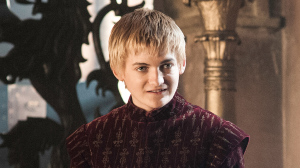
I told Jack Gleeson I sometimes listened to philosophy lectures in the car. “Who are you into?” he asked. “Well, I’m getting through the Greeks, the Stoics,” I replied. “Oh, the basics,” he said. : ) Here’s my interview with this very bright and thoroughly nice young man, as published in the Sunday Mail. Come visit the LUV Comics stand at Supanova! Where Jack will be, probably with a longer queue than us.
Being in TV show Game of Thrones is a bit like being a member of royalty: millions of loyal subjects and you get treated with reverence wherever you go.
Jack Gleeson would know. He plays the young king Joffrey in the popular HBO series.
“Definitely,” the 22-year-old says. “They really look after us on set. It’s funny to see the progression. Not like we were being abused in season one, we were very well treated, but as the show grew in popularity, in season two we got a few extra chocolate bars in the green room. In the last season we had very plush surroundings and everyone was very polite to us. So yeah, it did feel like people were being a bit deferent towards us, which is kind of uncomfortable, but, you know, it’s a comfortable job.”
Gleeson has played Joffrey – the sadistically minded young king who commands fear if not respect – since the beginning of the series until he took his final bow this year. The young theatre lover, who grew up in Ireland, has been acting since the age of eight. But recently he surprised fans by announcing that after his character’s timely demise he would be hanging up his crown and sceptre and retiring from acting – at least for a while.
Instead, he’ll remain on home turf in Dublin to finish his degree in philosophy with a view to potentially doing a Master’s.
“To call it academia would be a bit of a stretch. I’m studying philosophy at the moment. It’s not exactly a vocational study unless you do want to be an academic. I suppose I’m at that weird crossroads where everyone finds themselves at 21-22-23 where you’re kind of out of college and just excited to go with the flow.”
Is there a philosopher that resonates with him in terms of how to life a good life?
“It’s funny you should ask that. I could really go off on a ramble. I’d have to say yes and no, I enjoy (Austrian philosopher) Wittgenstein because there’s a certain Buddhist tendency to his first book that he wrote during World War I, which is kind of like a liberation from getting befuddled and transfixed by language and the ordinary banalities of life, where you really just live in the moment, that’s what I like.”
The other thing that will keep Gleeson busy is Collapsing Horse, the theatre company he co-founded with three friends in 2010.
“I kind of have a free-floating role, where I can be as hands on as I want to be and help with the writing, the directing, the publicity and the producing,” he says. “It’s nice to have the freedom, when one has the time, to devote yourself fully to something that’s a passion project.”
Many were surprised that he decided to step away from fame and fortune and walk a different path.
“They definitely do seem surprised and I’m not surprised that they’re surprised, because it’s obviously something that everyone dreams about, and it’s what I dreamt about. One of my big aspirations as a kid growing up, and even as an adolescent, was to be a famous actor, and that was always my goal.
“So it’s kind of one of those weird things where you get there and it’s not as fulfilling as you’d like it to be. I suppose for me it just didn’t fit in with how I was feeling. But I think for other people it’s a great life.”
For now it’s onwards and upwards for the young actor who is definitely playing against type. But his time on Game of Thrones will go down as an unforgettable experience. While their characters may always be at war, the clichés of the cast being one happy family are indeed true, says Gleeson.
“Even though we split up a lot and we film different scenes on our own or with one other character, whenever we get together for a big scene we always just hit it off. For me, it’s a matter of whoever I’m hanging out with. I have a lot of scenes with Peter Dinklage (Tyrion), Sophie Turner (Sansa), Lena Headey (Cersei), Natalie Dormer (Margaery), Conleth Hill (Varys). It’s just a blast and it sometimes doesn’t feel like work at all. It’s like hanging out with your friends.”
Conleth Hill and Peter Dinklage are the jokers in the family, he says.
“They are a little comedic duo. They bounce off each other very well. They do little impersonations and crack very funny jokes. They keep the morale high on set.”
Gleeson can be proud of taking the character of Joffrey to new levels. While he may the one that everyone loves to hate, surprisingly some fans come up to him who are pro Joffrey.
“Sometimes they do, actually, which is refreshing,” says Gleeson. “I don’t think they ever condone his actions. I think you have to have some kind of symptoms of psychopathy to do that, but some of them say, I find the scenes exciting, I find his motivations intriguing. That’s nice to hear because obviously as an egotistical actor I enjoy my scenes and I like my character, so yeah, it’s nice to have someone see past the superficial evilness of him and appreciate him as a well-written character.”
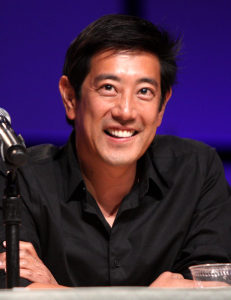
Grant Imahara’s home in Hollywood is a veritable workshop. The robotics engineer and star of MythBusters has all manner of toys in his garage.
“I have a lathe, a 3D printer, a vacuformer. It’s like a mini mad scientist workshop,” he says.
And he has put them to good use. Recently he created a steampunk ring-bearing robot for his friends’ wedding.
“He had tracks that he could drive around on like a tank, and he had a copper head with a moustache and a monocle. He had one ring in each hand in test tubes. It was awesome. It got featured in a bridal blog.”
Imahara has developed a knack for tinkering and tailoring since he first took apart the remote control at home when he was a kid. After studying electrical engineering at university, he worked for film companies Lucasfilm and Industrial Lights and Magic before joining the team as a host on one of the world’s most popular science entertainment shows MythBusters.
This year, however, he and his co-stars Tory Belleci and Jessi Combs say good-bye to the show as it returns to its original format with hosts Jamie Hyneman and Adam Savage.
“I’m sad to go,” Imahara says. “It’s sad to no longer be on the show and see my friends every day, but I feel so privileged to have been able to work on this TV show. The show’s been on 11 years, and I’ve been on the show for eight of them, and in TV years, that’s a long time. TV years are like doggie years. And that’s a tremendous amount of time to have the best job in the world, to be able to blow things up and crash cars and jump out of planes and shoot guns and all of this while teaching science.”
Imahara isn’t letting his engine idle however. Already the offers are popping up. As well as attending events such as the Supanova Pop Culture Expo in Australia, he has a number of projects on the cards.
Imahara likens it to breaking up with someone on Facebook. Suddenly, all these other people are asking you out on dates.
“Tory, Jessi and I have the same agent. After the announcement, several networks contacted our agent. So we’ve got numerous pitches into several networks. Nothing solid yet. But it’s kind of neat to be in that position.”
Imahara already has a strong CV. His geek credentials are solid. His tinkering techniques have been put to good use on such films as The Lost World: Jurassic Park, Galaxy Quest, AI: Artificial Intelligence, Terminator 3: Rise of the Machines, The Matrix Reloaded and the Star Wars prequels. For Star Wars he updated R2-D2 giving him a makeover for the prequel trilogy. A Star Trek fan, he has also stepped onto the bridge of the Enterprise, playing roles in web series Star Trek Renegades and Star Trek Continues.
In Renegades he plays the assistant to popular character Admiral Chekov, played by Walter Koenig. In Star Trek Continues he fills the impressive shoes of Sulu, originally played by George Takei.
“It’s like my childhood dreams come true,” Imahara says.
Imahara, who grew up in Los Angeles – his mum was a chief financial officer and his father was a motorcycle mechanic and carpenter – says he was always “that kid”, playing with Legos, building things and taking things apart to see how they worked.
“Once I figured out how to use a screwdriver, nothing was safe. It wasn’t until I got older that I learned to put things back together.”
To be able to do that for a living, and to inspire other young kids in the process, has been a real thrill. While he’s sad to wave goodbye to the MythBusters team, he can’t wait to see what happens next. Is there anything left on his bucket list?
“Oh my goodness, I’ve driven R2-D2 for Star Wars, and worked on the Star Wars movies, I played Sulu in Star Trek, worked on MythBusters,” he says. “I don’t know really if there’s anything left. Maybe if I had enough money, I would build a giant robot that I could ride around like Pacific Rim.”

I think I’m having a midlife crisis. And I’m loving it. Here are a few signs signs: I have redyed my hair with purple streaks. I have started going out a lot. I have developed appetites that could be described as cougar.
My driver’s licence, if the cops pull me over, might indicate that I’m actually 37, but I think I’ve been acting more like I’m 27. Or 17.
I choose not to call it a crisis, but a renaissance. Over the past 12 months I have felt I’ve had a reblooming. I’ve rediscovered all my favourite things. I’m more confident than ever. And I am embracing life like a long-lost friend.
What is going on? Last year I officially entered my late-30s. While more of a gnaw than a shock, it was a strange experience, like trying on an outfit that didn’t quite fit. Forty bobbed on the horizon like a Goodyear blimp.
Some things hadn’t quite been working out and I had to face some big decisions. I wondered where the past 10 years had gone. Life had hurtled by – so fast, I hadn’t been able to admire the view. And yet I felt I was standing still.
In my 20s, I felt like an adventurer, but now I was settled in my hometown contemplating my cat’s next neck scratch. I hadn’t written the Great Universal Novel. There was no husband or kids to speak of (just a very nice ex who still comes over and fixes things – I call him my “nusband” or non-husband). And life was a little, well, meh.
But on the plus side, no husband or kids!
I decided to look on the bright side and took myself off on a jaunt around the world. It was kind of like Eat Pray Love, but with less praying and more partying. On my adventures I met many inspiring people. In Portland, I hiked to beautiful waterfalls and stayed with a
cat-loving yoga teacher who let me borrow her couch and her cats. In a small town, I bunked in a house full of young men, who played computer games well into the night. I remember thinking, what am I doing? This is ridiculous. But it was a lot of fun.
I took some writing courses and met other frustrated novelists from around the world.
In San Francisco, I went out dancing all night. I’d forgotten how much I loved to dance. In New York, I watched the sun come up over the rooftops in Chinatown talking to a bunch of new friends – who were, shock horror, my age.
In London, I asked my friend, “Am I too old for pink hair extensions?” I didn’t wait for his reply. “Bugger it,” I said, “if I’m going to have a midlife crisis, I’m going to enjoy it.” I’d recently met a punk woman knocking on 60 who still had rad hair and stories of rubbing mohawks with all these cool bands.
The trip reminded me of a lot of things I’d forgotten I loved. When I came home, I tried to keep up the momentum. I wanted to go out and try new things and have adventures and go dancing. So I have been. I’ve met some swell people I wouldn’t have if I’d sat at home with Tim Tams and a tabby. And it’s been a fun ride.
A midlife crisis shouldn’t be a bad thing. If you’re at the top of the hill, stop and admire the view. It’s not about what’s lacking, but appreciating what you do have. And if you really think those things are lacking, well, go out then and get them. It’s never too late.
As usual, I like to take inspiration from comedians – they’re modern philosophers.
Here’s a couple of quotes I enjoyed recently. Ellen DeGeneres: “It must be around 40, when you’re ‘over the hill’. I don’t even know why it’s a bad thing. When I go hiking and I get over the hill that means I’m past the hard part and there’s a snack in my future.”
And Ricky Gervais said: “Got a proper job at 28. Gave it up to try comedy at 38. Decided to get healthy at 48. It’s never too late. But do it now.”
So a midlife crisis might be about discovering a second youth. But it’s much better than that. When you’re older, you realise time is finite, so spend it wisely. Life is short. So embrace every moment. Sometimes that just means embracing a cat. But if you want to go out and dance till dawn, do it. After all, you’re only young twice.
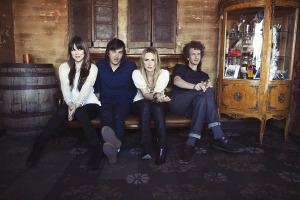
It’s a reunion that no one ever thought would happen – least of all the band involved. Veruca Salt were kick-ass alternative act in the ’90s, a girls-with-guitars band that earned a devoted following with songs like Seether and Volcano Girls, and were always on high rotation on Triple J.
The band was led by Nina Gordon and Louse Post, two best friends in sync and sympatico, who created awesome harmonies on stage while having a ball off.
After two albums, however, the wheels fell off. The group split, not over musical differences, but personal ones when their friendship imploded over relationship dramas. The friends stopped speaking. Post continued in Veruca Salt without Gordon, and Gordon embarked on a solo career, but the dynamic duo were no more.
Until now.
Now 16 years on, they’ve repaired the rift, rekindled the friendship and re-plugged in their guitars. A fresher-than-ever Veruca Salt are back on the road and rocking out with fantastic new songs that sound just as good or even better than their old stuff. They’ve reformed with the original line-up including Gordon’s brother, drummer, Jim Shapiro and bassist Steve Lack.
Excited to share their new sound with the world, the band is coming to Australia this week to revisit some old fans and maybe make some new ones.
“I am really enjoying it,” says Gordon, on the phone from her home in Chicago, with an exhale of genuine enthusiasm. “It is such a surprise to be doing this again. It’s sort of like this little miracle and it’s thrilling on so many levels and from so many angles.”
She says hanging out with Post again feels “shockingly familiar”, bringing back memories of sharing rooms and being on the road for 320 days a year.
“Our senses of humour and our sensibilities, they’re very similar, so we have a great time together. We have this capacity to talk for hours and hours and hours and we always did,” Gordon says with a laugh.
“I remember back in the day we rarely slept because we’d stay up all night talking, whether we were on the road, or on the phone back home in Chicago. Now the same thing happens and we have to stop ourselves, we have to force ourselves to go home.
“We’re having a great time. We’re having so much fun, on tour recently, being on the bus together, listening to all our favourite songs, putting on our make-up, we had a ball.”
Louise and Nina’s friendship repaired slowly. It began with a little email here, a birthday wish there. Occasionally they might send each other songs they liked. Then they sat down to dinner one night and had a “what if” conversation. Gordon had recently seen a reunion show of the band Mazzy Star at the Cochella music festival. Everyone was tweeting and talking about it. It sent some tinglings down her spine and and rumblings through her system. Could Veruca Salt possibly play again?
“I got this pang, this feeling that I hadn’t had, because that was really a closed book, I never considered it. And then all of a sudden I considered it, I was sort of scratching my head, going huh that’s funny, I have this desire to be in Veruca Salt again and play with Louise again.”
They found that not only was their friendship intact but their musical chemistry was as strong as ever. Veruca Salt 2014 have already released two new singles, It’s Holy and The Museum of Broken Relationships. The later song is inspired by an actual museum in Zagreb, where people can hang remnant memorabilia of their broken hearts, Gordon explains. And It’s Holy is a life-affirming song which talks about the reparation of their friendship and the awesomeness of life in general.
“When we first got together we were playing our old songs from our first album. Then Louise played a song for me, a song she had written recently and I was blown away by it and I knew at that moment we had to make a record. We were practising in my basement, and immediately I came upstairs and I said to my husband, ‘Louise wrote this incredible song and I think I want to write music again’, and he was so happy because it had been a while.”
In the 1990s, leading by example, Veruca Salt wrote the kind of songs, like the cryptically amusing Seether, that became unintentional feminist anthems.
“I don’t think that was something we were conscious of originally, certainly in the first album we were empowering ourselves, that’s all we were doing. And empowering each other. We were very conscious of the fact that at the time it was not as common for women to be fronting their own bands.
“We had a history of writing these team fight songs – on our second album there was a song called Awesome that was meant as just a little anthem for ourselves, a Team Salt anthem. So I guess that’s what It’s Holy is in a way, our 2014 version of our own team fight song.”
Now, as well as the music, they have other things to bond over. Post and Gordon are both mothers of young children. But not everyone is keen that band is getting back together. Before getting on the phone to do interviews and putting her kids to sleep, Gordon got a teary protest from her seven-year-old daughter.
“She said, ‘Mommy, why do you have to get the band back together again? Why do you have to make music again?’ The idea that I have things to do, that we’ve gone on tour, we’re going to Australia for two weeks…”
But for Post and Gordon it’s a second chance, a happy miracle
“We were young when we met and we had a very intense ride together. We split up in a very dramatic way and we never talked it through. So there was all this unresolved stuff, then time went by and it’s true about time healing all wounds.
“We were always yearning for that bond that we had with one another, and harmonising together was always special for the first day in 1991 when we met and were playing acoustic guitars in the living room. That was always something that was really precious and we just kind of trashed it. We trashed that whole aspect of our lives over something petty and personal, so I think we both with time realised this is ridiculous, life is too short.
“It really was a big surprise and a gift, not just in terms of what we are now able to do with one another musically, but also just in terms of life and perspective and the whole world and friendship in general and the feeling that anything can happen. It’s a cliché, but never say never.”

In the 1990s, Cibo Matto (“crazy food” in Italian) were an alternative band formed by two friends from Japan who met in New York. They made the kind of eccentric, catchy music that left you tapping your feet and scratching your head.
Their debut album Viva! La Woman featured 11 songs about food (Birthday Cake, Beef Jerky, anyone?) and the duo went on to create eccentric musical dishes for the next several years. With a heavy cult following, that included numerous famous fans, Cibo Matto even appeared on TV show Buffy the Vampire Slayer, performing at the fictional nightclub, The Bronze, with Buffy and Xander in attendance.
Now after 10 years apart, the girls are back together and making music as quirky and interesting as ever. Their new album Hotel Valentine is a concept album about a haunted hotel, with song titles including 10th Floor Ghost Girl, Empty Pool and Housekeeping.
“I think in some way all the albums are concept albums,” says Yuka Honda. “To me the band alone is a concept and then there are the things the band are thinking about at the moment.
“I don’t know what my favourite concept album is. I feel like all the music is like that. There’s always a story. When you listen to Eminem’s debut album you really feel his life, the story, how the songs came up and what’s behind it.”
Reigniting the flame with fellow Cibo Matto bandmate Miho Hatori was a real thrill. The pair have a very special chemistry they weren’t fully aware of in their youth, she says.
“We’re calling this time our second marriage,” says Honda. “Because it feels like the one in the 1990s we grew up much faster than we thought. Kind of in the way that you go out with someone in high school and you get pregnant and all of a sudden you have to start a family and jump into real life and you don’t even know if you really chose this person, you think, oh my god, things are happening. For a long time we were just trying not to drown because it was going so fast.
“After 10 years apart, we started to realise, wow, there was actually something very special about us. We don’t really find it anywhere else and it wasn’t just a coincidence and it’s something that we should take care of because it’s not something that happens in your life that often. This time we became aware of that and a lot more conscious of that.”
The two met in New York in the early 1990s, where they lived, made music and partied in the hipster hotspot of the East Village. Honda says she wasn’t really drawn to New York at first, being more of a hippy “oceans and forest and nature” type person. But it seemed fate had other things in store for her.
“I was kind of really bored in Japan and one thing led to another and ended up here. I didn’t mean to stay. But it was the only time I felt I heard a voice saying, you should go to New York, you should go to New York. So I came without knowing what it meant. And as soon as I came here, all these music related things happened and so there’s a part of me that still believes it was my fate that I came to New York.”
Talking Heads’ David Byrne was an early fan, attending one of their first concerts, and Warner Brothers records signed them on the strength of a demo cassette. Their music was an unusual cocktail of influences from all directions that made other bands seemed bland. But most of all, they were having fun. Honda remembers wild times, creative collaborations and relatively inexpensive living.
“The ’90s was the beginning of the gentrification of New York. The East Village was exciting and happening and everything was really cheap. You could go out with $10 and have a pretty good time all night. Also people were very creative. They’d get together for a party and there would be a DJ in a tree and fire and jugglers. We were creative, doing things for fun. And now you can’t really do it. There’s no space. Living is costly, certain things have definitely disappeared.
“It’s spreading out. It’s going father and father than New York. The great thing about Manhattan was that it’s a small island. It’s 4km wide, you can walk anywhere, so when it was happening here, the gravity was very strong because it’s felt like a big dormitory. You’d walk around the block and everybody was here.”
Honda still lives in an enviably cool situation now, sharing her living space with three other humans, as well as dogs and rabbits. They continue to be creative and crazy.
The band has worked with several fascinating people in their time, including The Beastie Boys, Tricky and Luscious Jackson. Their current record features the uber eccentric musician and comedian Reggie Watts, who Honda describes as “one of the most talented human beings I have ever witnessed”.
Cibo Matto also worked closely with Sean Lennon, who for a time was in the band. He and Yuka were a couple for a number of years, and remain friends. She produced his 1998 album Into the Sun, and he even took the promotional pictures for their current tour.
Yuka still works with Sean’s mum Yoko Ono, performing with the Plastic Ono Band and co-produced Ono’s 2009 record Between My Head and the Sky with Sean.
“It’s always a great challenge and a great pleasure working with her,” she says. “I have a lot of respect for her and she does things in a very unique way. When we do music together, music is just a vehicle for her expression. She’s not thinking, how am I going to play this chord in the most eccentric way? How am I going to use instrumentation in a way that nobody has? She’s thinking a lot more about what she wants to express and it’s so much about intuition, very robust raw energy with a kind of sense of transcendence attached. She doesn’t want to say how clever I am with this writing, or how interesting this use of rhythm is, she’s not interested in that. She’s interested in expressing her beliefs.”
While Cibo Matto have a huge following in the West, in their own country, they aren’t so well known. Honda says that now that she is far from Japanese culture she appreciates it more.
“When I was growing up there I hated everything Japanese. It seemed very slow and a lot of things seemed meaningless. Like tea ceremonies, where people are sitting around for an hour,” she laughs. “I was like, what the hell is this? What’s the point? Now I see the beauty of stillness and space and emptiness and waiting and attention and manner. All the things that seemed boring to me I see the meaning a lot better now I’m far away.
“It’s pretty wild. It’s a very old country and has a long history. The other part is the eternal teenager, constantly doing crazy wild things. I’m always very excited by a lot of things there, including food, TV shows, books.
“There’s a lot of underground culture in Japan. It’s very fascinating. People are not lazy so if they do something like a fanzine they’ll do an incredible amount of research and use quality paper and printing.”
As far as gender representations are concerned, Japan has both extremes, but she says in some ways women’s traditional roles are more respected than in the West.
“I think in Western countries you need to have a man’s job to be appreciated. For example, being a mother is not a job in Western countries. Being a housewife is not a job. It’s coasting. A housewife is a coaster in Western countries. But in Japan women raising children is considered a job. If you are applying for a visa and they ask you your job a lot of women will write housewife. In the Japanese financial system usually the husband will give the wife all of his earnings, and she becomes the financial minister of the house and she gives him pocket money, every day. His income belongs to both. The house is like an entity. So the woman has an important role to be a housewife. I think there’s a lot of dimension to it. You don’t really have to become a man to be appreciated.”
Honda’s own influences are far and wide, having grown up around the world. Travelling with her parents, she lived in not only Japan but Germany, Denmark and France. And in a surprise Australian connection, her brother even went to high school in Brisbane.
“I visited him there,” she says. “My parents thought it would be better for him to go to Australia than America. They wanted him to go to some English speaking country. My brother’s more athletic and not super social. They thought maybe Australia would suit him better. He lives in Japan now. He’s a yoga teacher.”
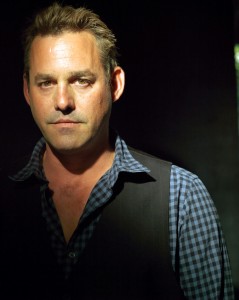
He was one of the most likeable characters on television, Xander Harris, the affable everyman, who was a rock of normality in the chaotic whirlwind of the Buffyverse. Since wrapping Buffy the Vampire Slayer in 2003, Nicholas Brendon has gone on to star in Criminal Minds, make nifty sci-fi films such as this year’s Coherence and, bonus nerd points here, even write comics. This weekend he is a special guest at Australia’s first Oz Comic Con. Ahead of his visit, we shot the shit in an amusing chat in which I learned that Nicholas Brendon is a lot like Xander Harris but likes to deliver lines that will clear out the room. And he reveals why Robert Downey Jr and Matthew McConaughey want his ass, bad.
You’re writing the comic series Buffy the Vampire Slayer Season 10 with Christos Gage. What’s it like writing Xander as opposed to playing him?
The fans love it because I’ll just riff on things that Xander would say. So I’m improving as Xander as Xander would improv, so that’s how I come up with the lines. Me and Xander are a lot alike. Our senses of humour are alike, very much so. When you’re on a TV show for seven years, writers typically will study the actors and their senses of humour, and will write like the actors, because that’s how they hear things. It makes their job easier. So Xander and I are very mano e mano.
I read somewhere that you hated Archie, which seemed funny to me and kind of surprising because Xander seems a bit like him in a way.
I was seven years old and I received this comic book and I just opened it up and thought it was the lamest thing in the world. I thought, ‘What is this?’ Why are the kids into this stuff?’ So, I got to page four and I thought, this is just not me. I wish that hadn’t been my first comic because then I probably would have read more comics. I started playing baseball that next week.
You also made a webcomic with illustrator Steve Loter called Very Bad Koalas. Do you hope to do something similar to that again? Was that a lot of fun?
Yeah, it was. My writing partner with that, Steve, he did all the drawing too, so we would come up with the stories and then the jokes and he would draw everything. Then he got a three-picture deal over at Pixar, so his time became no-existent. I had a blast doing those 26 that we did.
He said the most outrageous and disturbing things in the strip were your ideas. Is that true?
Yeah, yes… probably. Very much.
What’s your sense of humour like? Where does this stuff come from?
In terms of shocking, I try to think, what’s the worst thing that could be said right now? Like, what would clear out a room? I tend to start there. And then if there are kids in the room I won’t say it, and sometimes there are kids in the room and I do say it. Sometimes when I do Q&As, I will always start my panel by having a disclaimer, saying to parents and kids that I just want you guys to know that I work blue so if there are any kids in the audience go f–k yoursevles. That’s kind of how that happens.
That doesn’t sound too Xander.
If Xander could cut, that’s exactly what he would cut.
I wanted to ask you about the film Coherence too, which I’m really excited to see, and I read that you did it with no script. How was that as an actor?
It was challenging because we had no idea what was going on. But we were each given five to ten notes per day, because we shot it in chronological order. It makes you pay attention to everything that’s going on around you. It was a great acting exercise and it became a really great movie.
It sounds like a giant roleplaying game, to nerd out on you there.
If you’re into that sort of thing… (laughs)
So you didn’t see the ending until it was all put together?
I had no idea how it ended. I’m like, holy moly, this is awesome.
It is Twilight Zone inspired, is that right?
Yeah, 100 per cent. It really is like a great Twilight Zone episode.
Is that the sort of thing you were into growing up? What were you into growing up?
I watched Three’s Company and Chips and The Incredible Hulk, things like that. The Love Boat.
I want to ask you a question, which I ask a lot of people. I ask them if they remember their dreams, and if there’s a significant or stand-out dream that you might remember.
I had one last week where Robert Downey Jr was trying to make love to me.
You’re clearing the room now! Keep going…
He was aggressively trying to enter me. But then there was one I had about Matthew McConaughey where I got dropped off at an airport and Matthew McConaughey was there waiting for me to kill me, and then so I take off and then he takes off and then we go through this chase scene. And then when he gets to me, he kills me, and then I get up and I wake up and then I’m at the airport again. So, it’s Matthew McConaughey. So basically he chases me again, and then I get further along than I did last time and then he kills me. And then what happens is I remember every time that I die and then I’m back at the airport. So I learn his movements and then I get the upper hand on him.
Wow, what do you think that means?
Matthew McConaughey wants to make love to me.
It sounds like a movie.
It’s kind of like a screwed up Groundhog Day.
So you’re coming out here for our convention, have you been to Australia before?
Three times for work and one time I went to see my friend who was on a two-year honeymoon. We went camping and surfing.
I’m sure you’re going to get the royal treatment, but is there anyone that you fanboy out over at these events?
The only time I ever have before, there is a documentarian by the name of Morgan Spurlock and we were in Paris together doing a show. We were at the same hotel and Morgan came up to me because his girlfriend was a fan and took pictures to us. And I was talking to Morgan, and I didn’t realise how much I loved Morgan Spurlock.
As for your fans, how big is the Buffy family? Not just your characters and the people you work with, but all the people that you meet. How is it meeting these people after so many years?
I love it. The show too really helped a lot of people out through really bad times of their lives. And I hug all my fans too. I’m not sure if I’m going to be able to in Australia, because of time constraints, but I’ll give all my fans a hug and hear all their stories, so, no, I love it. It makes me happy.
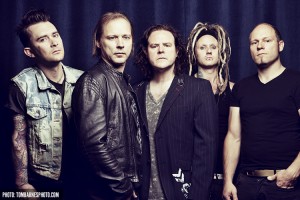
It’s been 20 years since Pop Will Eat Itself shook up Australian shores. But the UK band, who mashed up genres of rock, pop and hip hop, will be shaking it up again with a one-off show in Brisbane this week.
Founding member Graham Crabb is the man who has pulled together the new line-up, including co-vocalist Mary Byker, Killing Joke drummer Jason Bowld and Gary Numan guitarist Tim Muddiman. Crabb has been valiantly trying to make Pop Will Eat Itself happen since 2005. Then, the band performed a couple of reformation gigs in their home country, but unfortunately lead vocalist Clint Mansell couldn’t commit to further Poppies action because of his soundtrack work. Mansell, the ratty-haired frontman of the group, is now an award-winning composer, whose lengthy CV includes films such as Requiem for a Dream, Pi and Black Swan. But Crabb was undeterred.
“It’s something I wanted to do for ages really,” he says. “I tried to put the band back together but it wasn’t happening so I realised the only way I was going to get it all together was to get a new line-up.”
And it’s that PWEI Mark II that will be coming to Australia this week. But Crabb is quick to assert they are no nostalgia act. The group, whose hits include Can U Dig It? Ich Bin Ein Auslander and Def Con One, are working on a new record due in October.
“We keep banging our heads together and saying we’ve got to nail the title,” Crabb says. “We’ve got a lot of words we want to incorporate. We feel we’re close. The guys who are doing the artwork – the Designers Republic – have always done the Pop Will Eat Itself artwork. They’re wanting to know because they’ve got to do a design. So we should have it in the next day or so.”
As well as PWEI, Crabb is a member of newly formed industrial supergroup Primitive Race, which includes members of KMFDM, Skinny Puppy, The Mission and Fear Factory. Their heavy edged music combines electronic and machine-age technology to create an arresting soundscape. So, why do humans like the sound of music made by machines?
“That’s a good question,” Crabb laughs. “Why do we? I suppose it can only mirror real life. Noises are everywhere and who knows when you hear a noise what goes on inside your head, what connection does it make? A machine banging away, what does that represent? But it’s obviously something in your head trying to make sense of things you’ve heard in the past. It does somehow relate to an emotion as well.”
With the musical landscape changing rapidly, it’s difficult to know what trend will strike next. But Crabb has a theory about that.
“I think what new things do is they hone in on the detail in something. Dubstep zoomed in on that dirty synth sound. Drum ‘n’ bass zoomed in on a drum beat and the big bass sounds. Anything new in itself is taking something small and blowing it up bigger. The future is probably there already but you don’t realise.”
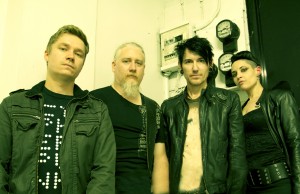
Futuristic Urban Cult was the name of seminal Brisbane industrial band Dogmachine’s one and only album. Known for their epic live shows in the 1990s, the band went underground in the early 2000s.
When Pop Will Eat Itself were looking for a support act for their Brisbane show, someone threw out the name Dogmachine. It was a name that hadn’t been bounced around in years. Singer Kraig Wilson gave it some thought. Then he gave it a lot of thought, and now the band are reforming to play with PWEI for the special one-off support show at their Brisbane gig.
Playing with the likes of White Zombie and Atari Teenage Riot in their heyday, Dogmachine had a reputation for their manic live shows – which included such diverse percussion as car bonnets and angle grinders.
“We put everything into it,” says Wilson.“We weren’t the kind of band that just gazes at their shoes. It was more of a performance.”
“When you’ve got a grinder that is one of the instruments that sets the scene,” adds guitarist Roger Menso.
Says Wilson: “We used to use a lot of metal percussion, a steel drum or a car bonnet with a pipe, that sort of thing. The grinder always got people going because it’s such an intense visual thing. If you’re in the front row and you get hit by the sparks it reminds you that you’re alive.”
Like Pop Will Eat Itself, Dogmachine were interested in the musical intersection of man and machine.
“I’ve always been interested in the fusion between the human playing and the electronics,” says Wilson. “I think they play off each other quite well. One of the things that appeals to certain people is the fact that with the technology it means you can write a whole album on your own. So it’s good for loners like me.”
While electronic music continues to evolve, something you hear less of in music these days is the sampling of quotes from films, which was big in the industrial scene’s heyday. Dogmachine sampled quotes from Robocop, Hellraiser and even Black Adder. Their 1997 album Futuristic Urban Cult is now available on iTunes and the band’s Facebook page is an archive of memorabilia and photos. Plenty of fans are now coming out of the woodwork keen to attend their show. So could this mean a future with more Dogmachine gigs?
“Initially it was just going to be a one-off,” says Wilson. “But I’ve been surprised at how much interest it’s generated. How many people have gotten excited about us playing again.
There’s a few things possibly on the horizon. It’s a possibility.” Futuristic Urban Cult is available on iTunes. Pop Will Eat Itself and Dogmachine perform with Monster Zoku Onsomb at the Zoo, Brisbane, on September 5.
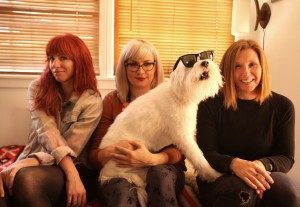
Former Hole drummer Patty Schemel is back on the drum kit, smashing it up with one of the coolest bands around – all-girl punk outfit Upset.
But it wasn’t so long ago that she was on an altogether different path. Schemel, far right, rode the highs and lows of a life of drugs and rock ‘n’ roll, touring the world with the brilliant but messy rock band, Hole, fronted by the brilliant but messy Courtney Love. She saw her good friends, including Kurt Cobain, succumb to suicide and addiction – and nearly lost her own battle with heroin, which led to a life on the streets.
She documented her journey in a film Hit So Hard, which came out in 2011. The acclaimed film featured interviews with Hole members Love, Eric Erlandson, Melissa Auf der Maur and many others, plus reams of archival footage that Schemel shot during Hole’s world tour in ’94 and ’95.
Making the film was a cathartic process. “Just going back through all the footage was like going into a time machine,” says Schemel, now 47.
“When we started doing that film I wasn’t playing music at all. I didn’t want to play music. Slowly through the experience I started playing. It was good to reconnect with them (Hole) and then through the process make some art out of the experience and to tell my story.”
The mid-’90s were an intense time. In April 1994 Kurt Cobain died of a self-inflicted gunshot wound in his Seattle home. His widow, young mother Courtney Love and her band were faced with a tough decision: to give up or go on. Their acclaimed album Live Through This was released just four days later, and two months later, Hole bassist Kristen Pfaff died of a drug overdose.
The band plunged into the only thing they knew how to do well: play music. They embarked on a world tour in August.
“It was chaotic and also it was such a tough time just because it was our first tour after Kurt and Kristen had died,” says Schemel. “We hadn’t sorted out anything. We just had these shows to play. We needed a bass player and we just went out and did it. There were days that were really hard and days that were amazing. But for a lot of it, I was just out of my mind on drugs or drunk or whatever.
“There were moments that were really special but now thinking back and looking at it it’s nice to play music as an adult, but also to be a sober adult, to be able to experience everything, and to do something – all of that pressure and anxiety and extreme joy and happiness, I know how to sort through it all now.”
The lowest point came for Schemel when she was replaced by a session musician on the band’s album Celebrity Skin. A blow to her confidence sent her further down the path of drugs and eventually to the streets.
“That’s the trick of the whole thing (drugs), nothing I ever saw, or any warning, nothing worked; the only thing was losing everything and just wanting to try one more time to live again. That was the wake-up call. I can’t live anymore this way.”
While it was a challenging time, there was also plenty to celebrate in the 1990s. It was an amazing era for women in rock. Girls were forming bands like never before, picking up not only microphones, but guitar and bass and drums. Female driven bands were hitting the mainstream of punk, pop and rock, getting high rotation on MTV, with many, like bands in the Riot Grrrl movement, directly pursuing a feminist agenda.
“That was a great time for women in music,” says Schemel. ”I’d like to see more bands like Bikini Kill addressing feminist issues.”
While they may not be as visible as before, girls are still rocking it loud. Schemel name-checks bands like Dum Dum Girls and Potty Mouth. Performing with a new generation of talent is a lot of fun. Ali Koehler and Jennifer Prince of Upset were both Hole fans before they hooked up with Schemel. The band formed in a very 21st century way, with singer-guitarist Koehler contacting Schemel over Twitter. They bonded over a similar musical allegiance.
“It’s just fun to play punk rock, fast music with some melodies, and to play with other women,” says Schemel.
Now Schemel’s life is very different. She also teaches drums and volunteers at the Rock Camp for Girls in Portland, Oregon. The kids inspire her as much as she inspires them. It reminds her of when she first started out. “I wanted to play the toughest thing I could think of so I started playing drums and got into punk rock,” she says.
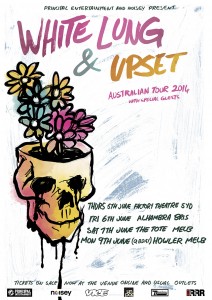 Schemel is also happily married and has a three-year-old daughter Beatrice with her wife Christina. Her life may have mellowed considerably, but she is still a rockin’ mum.
Schemel is also happily married and has a three-year-old daughter Beatrice with her wife Christina. Her life may have mellowed considerably, but she is still a rockin’ mum.
“I think (our daughter) thinks that all other mums drive around with vans full of drums. But she knows that I go play shows. Me and Ali and Jen from Upset put together a song for a fundraiser for her pre-school.”
Since releasing Hit So Hard, plenty of people have thanked Schemel for sharing her story. It has made an impact with many, including the gay and lesbian community, musicians and their fans, and addicts in recovery.
“That was one of the things about the film that was important when I was travelling around and doing the Q&As afterwards,” says Schemel. “Telling the story connected with people. You can get through it.”
Poster art by Jase Harper who will be appearing at the Zine and Indie Comics Symposium, August 29-31.